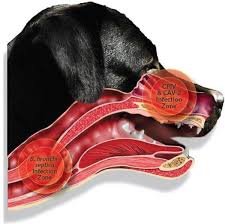
If you are a pet owner, understanding kennel cough is critical for the health and well-being of your furry companion. This contagious respiratory disease can spread rapidly among dogs, especially in environments where many animals are present, such as kennels, dog parks, and grooming facilities. In this article, we will delve into the symptoms, treatment options, and prevention strategies regarding kennel cough to keep your pet safe and healthy.
What is Kennel Cough?
Kennel cough, scientifically known as canine infectious tracheobronchitis, is an upper respiratory infection in dogs typically caused by a combination of viruses and bacteria. The most common culprits include Bordetella bronchiseptica, parainfluenza virus, and adenovirus. Understanding the nature of this illness is essential for any dog owner, as it can affect any dog, regardless of age or breed. The name "kennel cough" originated because the disease is often contracted in confined spaces where dogs gather, such as boarding facilities, daycares, and even during dog shows.
Symptoms of Kennel Cough
Recognizing the symptoms of kennel cough quickly is vital. Early detection can help mitigate the spread of this illness and lead to more effective treatment. While some dogs may experience mild symptoms, others may become quite ill, making it essential for pet owners to be vigilant.
- Dry, Hacking Cough: The most characteristic sign of kennel cough is a persistent dry cough that may sound like a honking noise. It can be triggered by exercise or excitement.
- Runny Nose: Many dogs experience nasal discharge that can be clear or cloudy. This may accompany other respiratory symptoms.
- Watery Eyes: Eye discharge may occur alongside nasal discharge, indicating an infection.
- Lethargy: Infected dogs may show reduced energy levels and an overall lack of enthusiasm for activities they usually enjoy.
- Loss of Appetite: Affected dogs may show decreased interest in food, which can lead to further health complications.
- Fever: Some dogs may develop a mild fever in response to the infection, which can be checked by taking their temperature.
- Gagging or Retching: Dogs may also exhibit gagging or retching due to the irritation of their throat, which can be distressing to witness.
Diagnosing Kennel Cough
If you notice these symptoms in your dog, it’s crucial to consult your veterinarian immediately. Diagnosis is usually straightforward and may involve a comprehensive physical examination, medical history, and sometimes laboratory tests to rule out other health issues. In some cases, your vet might conduct a tracheal palpation, feeling for a cough reflex, which can help confirm the diagnosis of kennel cough. Early intervention is key in managing kennel cough effectively, as untreated cases can lead to more severe respiratory infections or pneumonia.
Treatment Options for Kennel Cough
While kennel cough often resolves on its own, several treatment strategies can help alleviate symptoms and speed up recovery. Here’s what you need to know:
1. Home Care
Many dogs can recover at home with proper care. It’s essential to ensure your dog gets plenty of rest, stays hydrated, and has access to a comfortable living environment. Keep your dog indoors and limit their exposure to other pets until they’ve fully recovered. You may also consider using a humidifier to ease coughing and soothe sore throats, as moisture can help relieve irritation in the airways.
2. Veterinary Treatment
Your veterinarian may recommend a combination of the following treatment options based on the severity of kennel cough:
- Cough Suppressants: These can help reduce coughing and make your dog more comfortable, especially during the night.
- Antibiotics: If a bacterial infection is suspected or if your vet believes it may prevent complications, antibiotics may be prescribed to help combat the infection.
- Anti-inflammatories: Medications may help reduce inflammation in the airways and improve your dog's overall comfort.
- Bronchodilators: In some cases, bronchodilators may be prescribed to help ease breathing difficulties.
3. Quarantine and Isolation
To prevent spreading kennel cough, it’s crucial to isolate your dog from other pets until symptoms resolve. Limiting their interaction with other dogs will help contain the infection and reduce the risk of outbreaks. Maintaining good hygiene practices, such as washing bedding and cleaning shared spaces, can also be beneficial.
When to Seek Emergency Care
While most cases of kennel cough are mild, certain signs indicate that your dog may need immediate veterinary attention. If your dog exhibits severe lethargy, difficulty breathing, persistent high fever, or if you notice an increase in coughing severity, do not hesitate to seek emergency care. These symptoms may indicate that the condition has progressed or that your dog is developing a more serious health issue.
Preventing Kennel Cough
Preventing kennel cough is always better than treating it. Here are some effective strategies to safeguard your pet:
1. Vaccination
Vaccination is a crucial step in protecting your dog from kennel cough. While the vaccine may not guarantee complete immunity, it significantly reduces the severity of the disease and helps prevent outbreaks. The kennel cough vaccine is typically administered as a nasal spray or through injection and is highly recommended if your dog frequently interacts with other pets.
2. Avoiding High-Risk Areas
Limiting your dog’s exposure to crowded places, particularly during outbreaks, can also lower the risk of contracting kennel cough. Be especially cautious about visiting dog parks, grooming facilities, doggy daycares, and kennels. Always check if these places have health and vaccination policies in place.
3. Regular Health Check-ups
Routine veterinary check-ups can help ensure your dog is healthy, up to date on vaccinations, and receiving proper preventive care. Regular examinations allow your vet to monitor your dog’s overall health and detect any potential issues before they become serious.
4. Improve Air Quality
Keeping your home environment clean and well-ventilated can help minimize the risk of respiratory infections. Regularly clean your dog’s living area, wash their bedding, and use air purifiers to reduce allergens and irritants in the air.
Living with a Recovering Dog
If your dog has recently been diagnosed with kennel cough, be patient during the recovery process. Provide them with a quiet space to rest and monitor their symptoms closely. Gradually reintroduce them to regular activities as their condition improves, but avoid strenuous exercise until your veterinarian gives the green light. Continue to keep them away from other pets until you are certain they are no longer contagious.
Conclusion
Understanding kennel cough is essential for any dog owner. By recognizing the symptoms early, seeking appropriate treatment, and implementing preventive measures, you can protect your furry friend from this infectious disease. Always consult your veterinarian if you have any concerns about your pet’s health. They are your best resource for information and care. Don’t hesitate—prioritize your dog's health today! Armed with knowledge about kennel cough, you can confidently ensure the safety and well-being of your beloved pet.





Share:
Understanding Feline Leukemia and AIDS
Exotic Pets: A Care Guide for First-Time Owners